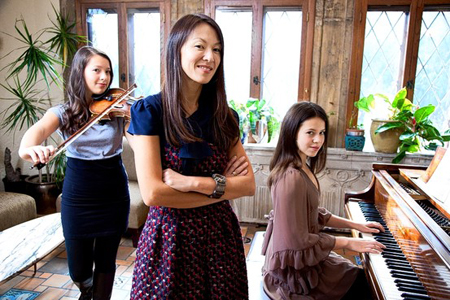
“This brings me to my final point. Some might think that the American sports parent is an analog to the Chinese mother. This is so wrong. Unlike your typical Western overscheduling soccer mom, the Chinese mother believes that (1) schoolwork always comes first; (2) an A-minus is a bad grade; (3) your children must be two years ahead of their classmates in math; (4) you must never compliment your children in public; (5) if your child ever disagrees with a teacher or coach, you must always take the side of the teacher or coach; (6) the only activities your children should be permitted to do are those in which they can eventually win a medal; and (7) that medal must be gold.”
– From the book “Battle Hymn of the Tiger Mother,” by Amy Chua (You can read more excerpts of her book here)
Amy Chua is a first-generation Chinese immigrant and her recent book has caused quite a stir within the world of parenting. Besides being a professor at Yale Law School, Amy is a supporter and practitioner of “traditional Chinese parenting.” Though she has stated the ethnicity really doesn’t matter, her traditional Chinese parenting involves a rigorous academic career for her children at the expense of sacrificing time for leisure or fun. This book almost completely satisfies the stereotypical Asian parent.
Raised with tough love herself, Amy is thankful to her parents for her successes today and holds deep love for them. She argues that though the actions may be harsh sometimes, the intentions are are based on love and they result in a better life for the children. An interview with her two daughters reveal that though sometimes they find their conditions a bit unfair, they do recognize their mother has the best of intentions for them.
The controversy around this book is not about the usage of ethnicity as symbols or labels; the Chinese parent could easily be the African-American parent and the Western parent could easily be a Muslim parent. The comments flew over such things like if calling your children “lazy, self-indulgent, and pathetic” is “good parenting.” It may be true that due to conditions in different parts of the world competition for a high standard of living varies and therefore for success, parents of a certain ethnicity may push their children harder. But at what point does “knowing your children can do better” turn into verbal abuse, which could have lasting psychological impacts on children? On this issue I am a moderate; of course some sort of discipline is needed around the house, but not an all-encompassing torture.
Thought from the book Amy has received a lot of hatred, her book is more of a memoir and it is more about how she has changed, and indeed she has. Because of her love for them, Amy has allowed her daughters to practice less music and go to sleep-overs as she fears of losing them. The book is about her development as a parent and she has said that there were things she did that she was not proud of and she would make certain changes. By far this book is not exactly a how-to guide and though Amy has changed, she still stands by her principles of tough-love.
For a slightly comedic response to her book by Roger Collier of the Ottawa Citizen: Why Caucasian fathers are superior.

I believe that parents have a huge influence on a child's academic success as well, fostering the attitudes and environment of encouraged support for academic success. Tough love is just a sensationalized method of parenting that just demonstrates the rigid sense of stability every parent wants to have with their children. Studies are inconclusive as to whether abusive parents have resulted in abusive children, so you can't be sure of the relationship. I can't say for sure that tough love is a good parenting method, but she does have the best intentions for them in mind when she pushes them to be the best, and let's face it, the real world isn't too far from administrating tough love either.
Comments are closed.